Half a Loaf of Kung Fu (1978)
Directed by: Chen Chi Hwa
Written by: Chen Chi-Hwa, Jackie Chan, Tang Ming-Chi
Starring: Dean Shek, Jackie Chan, James Tien, Lung Jung-Er
AKA YI ZHAO BAN SHI CHUANG JIANG HU
HONG KONG
AVAILABLE ON BLU-RAY
RUNNING TIME: 97 mins
REVIEWED BY: Dr Lenera
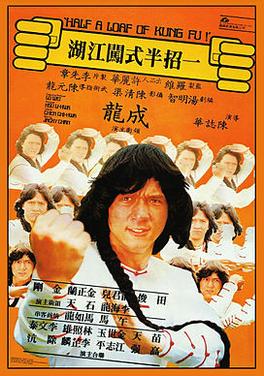
Gong is something of an acrobat, but he’s certainly no kung fu master. Desperate to practice and thereby become one, he gets a job as a “kung fu instructor handyman” at the house of Mr Wu, but flees when found spying on a lady who’s said to be a witch. Encountering a bounty hunter and a bandit battling it out, after they’ve killed each other Gong takes the body of the bandit to collect the reward money, pretending to be the legendary Whip King. Using the money from the reward, Gong tries to find a master to teach him, but what good is that if the people he finds seem to be teaching him techniques that don’t actually work? He won’t be much good protecting “the evergreen gold pieces” and “the soul pill” from several factions of bandits, surely?
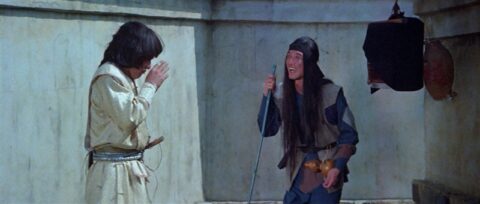
Half A Loaf Of Kung Fu was another Jackie Chan film that I hadn’t actually seen before, and it doesn’t have a particularly good reputation, though after watching it I don’t really understand why. For a start it’s the first film in which, apart from scattered scenes, he was able to attempt kung fu comedy, so is therefore of considerable importance, though producer Lo Wei wasn’t impressed; after giving Chan and director Chi Hwa-Chen [with whom Chan had got on so well making Snake And Crane Arts Of Shaolin] free reign to do what they wanted, he shelved the result until 1980 when he finally released it to cash in on Chan’s huge success elsewhere, and Hey Presto – it made even more money than the same year’s The Young Master, which seemed to take a few bits and pieces from this. And it’s a fascinating experimental work, Chan clearly trying loads of stuff out and seeing what works and what doesn’t. The humour is often very goofy, and some of it is lower than Chan would have done a few years later – where else do we have him accidentally touch a woman’s breasts than walk with a huge erection, while even taking down all advertisements of a job he’s just got is pretty low for a Chan character – but if City Hunter tickles your funny bone than you should have lots of fun here as Chan, Hwi-Chen and screenwriter Tang Ming-Chi throw everything they can think of at us and see what sticks. The plot is a mess, feeling as if characters and scenes were randomly added [which they may well have been, considering how many Hong Kong movies began shooting without a proper script], but it nicely parodies what we’d normally get in a more serious offering.
The title sequence is an absolute hoot. In fact I wouldn’t be surprised if some consider the film proper to be a disappointment, not living up to the beginning. I wouldn’t go that far, but you haven’t lived till you’ve seen Chan take the traditional martial arts movie beginning where the main star shows us some moves, and run with it, mocking subgenres and typical situations. He’s first seen sitting cross legged looking very serious with his hands in a praying position; however rather than continuing to pray he moves his joined hands to his side and rests his head on them so he can go to sleep. Then he appears acting and looking like Zatoichi, with some mannerisms that are identical to ones done by Shintaro Katsu, the actor who played the blind swordsman so many times, though of course others are just plain Chan, and you’d never have seen Katsu struggling with his blindness and running away. Other delights include Chan dying on a cross as a few notes from Jesus Christ Superstar are played on the soundtrack, Chan as a Shaolin-type master pointing at a row of monks before they all point back at him and make him do menial tasks for them in speeded up fashion, Chan practising with a wing chun dummy that’s only one foot tall, and finally Chan as another swordsman somehow killing lots of people who are surrounding him without even touching them with his sword before saying “no way”! He’s then seen asleep in a tree before immediately getting into a fight, and Chan’s character is a little dislikeable, but we can still see the beginnings of the first version of the Chan archetype, the one who would begin as a rather arrogant character, though as the film continues we’re also seeing the third, the hero who can sort of fight but gets out of situations more by luck, agility and being silly – and for a fan who has loved Chan for most of his life yet hadn’t yet seen this film it was exciting to watch!
The story is undoubtedly rather haphazard though; I’ll try to summarise the first two thirds of it without confusing the reader, though there are so many major characters that don’t all have names I might get a bit lost. Gong is trying to get a job and, after losing out on one position where he’s told to sweep the floor instead of be a bodyguard, gets a rather undefined place in this big house where Mr. Wu and a mysterious female guest live. He’s caught spying on this possible witch who seems to cause the death of his immediate boss [not that the character’s supernatural abilities are ever shown again] and escapes. After a urinatory gag, with Gong trying to pee against a wall but being thwarted by the same person twice [Wu Ma being about as Wu Ma-ish as you could ever hope for], he runs into a guy [I don’t think he’s named but he’s played by the always memorable Dean Shek who seems to do “snooker-fu” at one point] who teaches him a move called The Concubine, before bumping into Fong and quickly finding out that The Concubine isn’t really a thing, though someone wounds Fong from afar and a beggar steps in to defeat the witch. Fleeing again, he then sees this fight which could be an opportunity for him to get some money, though at least he buries the other body quite nicely. The Beggar teaches him two more questionable styles and sends him on an errand to give a token to a man named Fong, and he also thinks that he’s good enough to protect these treasures from robbers. In fact three clans are after these things and Fong is joined by others including two ladies; Fong’s daughter and a lady named Miss Yu who’s the sister of the bounty hunter, in setting out to find and protect the carriage with the treasures against all these villains – including a surprise one which isn’t really a surprise considering who plays him!
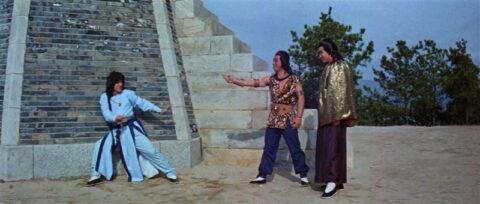
Chan’s character often uses his agility to keep him going against opponents before guardian angels usually step in. An early fight with a very tall man sees him flee into a chicken shack where he resorts to throwing eggs, then actual chickens, Chan already using the environment that’s around him. For a while the best fight action is done by others, notably Miao Tian as Wu when he faces off against Julie Lee as the witch who’s also the head of the ‘poison clan’; Tian gets some good moves in while Lee jumps all over the place in a parody of a wuxia convention. The daft techniques taught to Gong get a lot of mileage in a few encounters, but we don’t get much of him properly assimilating, combining and refining such techniques, which I suppose is nice in a way; we don’t get the huge enjoyment that us fans of these films tend to get out of a big training sequence, but then again such things are being parodied, and I’ve come to rather like that scene of Gong building up his fighting styles[s] on his own; surrounded by such lunacy and deceit, this is what he has to do, and we do get some early Drunken Boxing moves and poses. Did we need two teachers? – oh no, that’s actually three if you think about it – but then again we also have multiple villains which is okay I guess except that there isn’t room for all of them to get a big fight with either Gong or one of his aides, though virtually everyone in the film comes to blows at some point, with loads of short sharp encounters and a nice pitched battle which suddenly seems to dissipate. Doris Lung as Fong’s daughter and Kim Jeong-nan as Miss Lu do both get moments to really shine though they’re still rather short. Chan, helped at first by Lung, gets to fight James Tien who looks pretty impressive fighting-wise which isn’t always the case, Chan’s best move here swinging Lung around, a gag repeated in City Hunter. while the final duel with Lo Chao-hsiung has two others aid him for a while. It’s decent, though the nicest touch is Gong looking at dropped pages of a technique manual in between knocks.
Choreography is mostly pretty good with a few sloppy bits; Chan was just learning. While there aren’t any truly amazing stunts or many shots where it’s obvious that Chan could have suffered some serious damage and even more than that, there’s certainly some impressive stuff here, Chan’s brief battle with a man with two axes while he’s weaponless being a real highlight, with some amazingly cool dodges. He also rips off a ponytail and utilises it as a nunchuku, while another cool instrument is a curved blade on the end of a chain. A short bit of bullfighting was expanded in The Young Master into something terrific, while Chan’s desperate grabbing and falling were also continued in that movie; the similarities are quite evident, the likes of Drunken Master being a little different. In terms of comedic fights, an early dream sequence where Gong is being bested by some bandits and, after eating some grass, becomes really strong to the Popeye theme is probably one that’s vividly remembered by those who’ve viewed this film. No doubt the ponytail scene [I can’t find exact details] was one of the bits that was removed from the three minutes-shorter UK video release, but what about the other two minutes? The film was an ’18’ anyway, so surely the sexual gags would have been okay? The BBFC sure were weird – actually they’re still weird though largely in a different way. You could remove just a few things and end up with a film that would be okay for kids, who would probably love it, so why the high rating both then and now? In terms of comedy, the best set piece is probably a lengthy scene in an inn where Gong steals some money and has it taken from him in turn; it’s well staged and sustained. Perhaps things like Gong riding on a statue of a horse for no reason whatsoever, and knocking over a villain with his arse, do jar with the many deaths, some a bit bloody, in the final third which has more seriousness, but then Hong Kong films often went on to combine such extremes, so I don’t know why many writers cricitise Half A Loaf Of Kung Fu‘s back and forth tone so much.
The plot though could certainly have done with far more some clarity at times, it’s sometimes hard to keep track of all the various characters and what they’re up to. Did some actors just show up hoping for a part and Chan and Hwa-Chen quickly write them in? The very low budget shows throughout though there’s some nice use of Taiwanese locations. The weather changes drastically within the same scenes while strange sound effects, speeded up footage and jump cuts abound, though some of the latter may be frame cuts due to damage; apparently this version has quite a few of those. Frankie Chan’s score compiled from pieces by others didn’t throw up any familiar tunes to me, but its exaggeration of the different kinds of situations is amusingly over the top and even includes some comedy scoring. This experimental exercise, Chan trying stuff out and seeing what worked for him and what didn’t, doesn’t hang together but delivers a whole lot of memorable moments, its total lack of discipline being rather endearing.
Rating: 












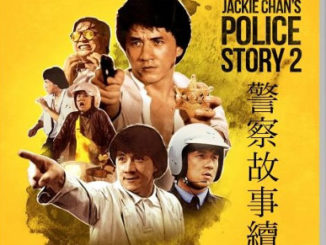
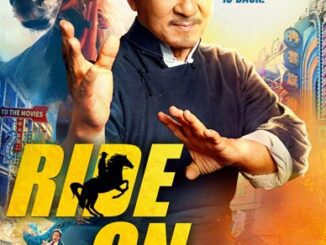
Be the first to comment